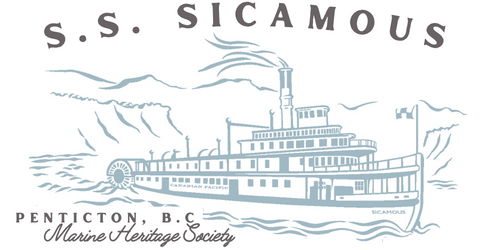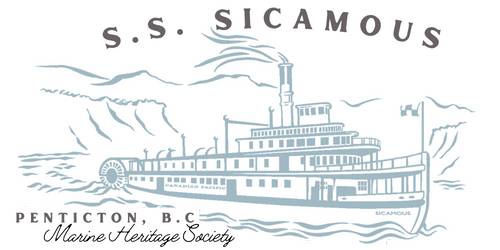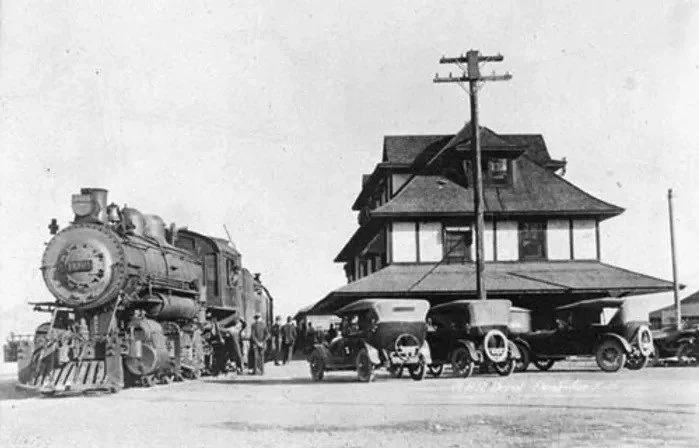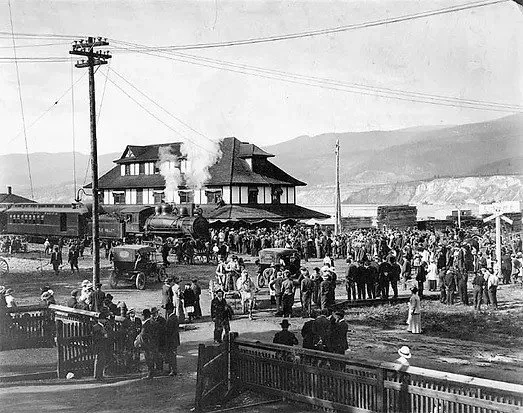Penticton B.C.
Penticton Station
The name Penticton is derived from a word in the Okanagan language. It is conventionally translated as "a place to stay forever" but is actually a reference to the year-round flow of Okanagan Lake through Penticton where it enters Skaha Lake. Differing accounts of the meaning are given in the BC Geographical Names entry for the city:
Place where water passes beyond.
— Information from Isaac Harris, published in Vernon News, July 18, 1918; compare with: "Derived from the Okanagan dialect of the Salish tribe, the word Pen-tak-tin meaning 'a place of permanent abode where waters pass by'." (50th Anniversary booklet of Penticton, 1958)
From the Indian name Pente-hik-ton, "ever" or "forever", referring to the constant, steady flow of the Okanagan River out of the lake.... applied by the Indians to the locality at the outlet of the lake.
— c1980 advice from Randy Bouchard, BC Indian Language Project. - Wikipedia
The area was first settled by the Syilx people(Okanagan people), who settled around the city's two lakes: Dog Lake(later renamed Skaha) and Okanagan. Today, their descendants form the Penticton Indian Band, a First Nations government part of the Okanagan Nation Alliance.
It was not until 1886 that Thomas Ellis and his family came to the valley. He started to develop the community by building a cattle empire, and planting fruit trees. The Ellis family were the first known white settlers to the area, and Thomas Ellis is credited with settling the town of Penticton.
The Penticton Hotel was established in 1892 by Ellis, who positioned it around the local government area, which was located on the first road - Front Street.
The sternwheelers also began operation on Okanagan Lake in 1892, which meant that more services could be shipped to and from the area.
By 1907 a group of local residents had formed their own local government, in the hopes of promoting the area. It was referred to as the Board of Trade, and they attempted to specialize in arts, commerce, education, and recreation.
Penticton was incorporated as a district municipality on December 31, 1908. By the next year, the fruit trees planted by Ellis, many of them apple trees, started to bear fruit. This led some residents of the area to pack fruit in boxes and begin the process of distributing it, eventually worldwide.
In 1900 the local business leaders had begun campaigning for a rail line direct to Penticton and by 1910 the Kettle Valley Railway(KVR) was about to be a reality. In 1912, the Canadian Pacific Railway (CPR) opened the Incola Hotel for the city, in anticipation of the arrival of the expanded services of the sternwheelers and the arrival of train service on the KVR. The Incola, operated for approximately 70 years.
By May 31, 1915 Penticton was a thriving community, a destination for commerce, travelers, and settlers alike. The launch of the KVR was an exciting day for everyone in the region.
Photo courtesy of Library and archives Canada – opening day on the Kettle Valley Railway, May 31, 1915.
Penticton was one of the busiest stations on the Kettle Valley Railway. Crews were frequently replaced here, by a fresh lot. Many passengers were dropped off or picked up in Penticton to carry on their journeys. Some would board one of the paddle wheelers, which would take them to Okanagan Landing and connections to the mainline of the CPR, for trans Canada travel. Freight was loaded on the steamers or the Canadian Pacific Barge to travel up the Okanagan Lake system to its final destinations.



